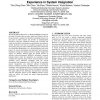190 search results - page 25 / 38 » Generic models in the advanced IRCM assessment model |
JTAER
2008
13 years 9 months ago
2008
The adoption of advanced integration technologies that enable private and public organizations to seamlessly execute their business transactions electronically is still relatively...
BMCBI
2004
13 years 9 months ago
2004
Background: Recent genomic and bioinformatic advances have motivated the development of numerous network models intending to describe graphs of biological, technological, and soci...
IJCAI
2007
13 years 10 months ago
2007
In the context of operative disruption management, decision support systems have to evaluate the typically manifold options of responding to disturbances: The temporal shift of ac...
ECIS
2004
13 years 10 months ago
2004
Speed and availability of information, delivered in past years by Internet technologies, made it easier for any company to outsource primary activities, which resulted in unbundli...
DGO
2008
13 years 10 months ago
2008
The Florida Public Hurricane Loss Model (FPHLM) developed in the State of Florida offers an open, public and effective tool for the government to regulate the insurance ratemaking...

